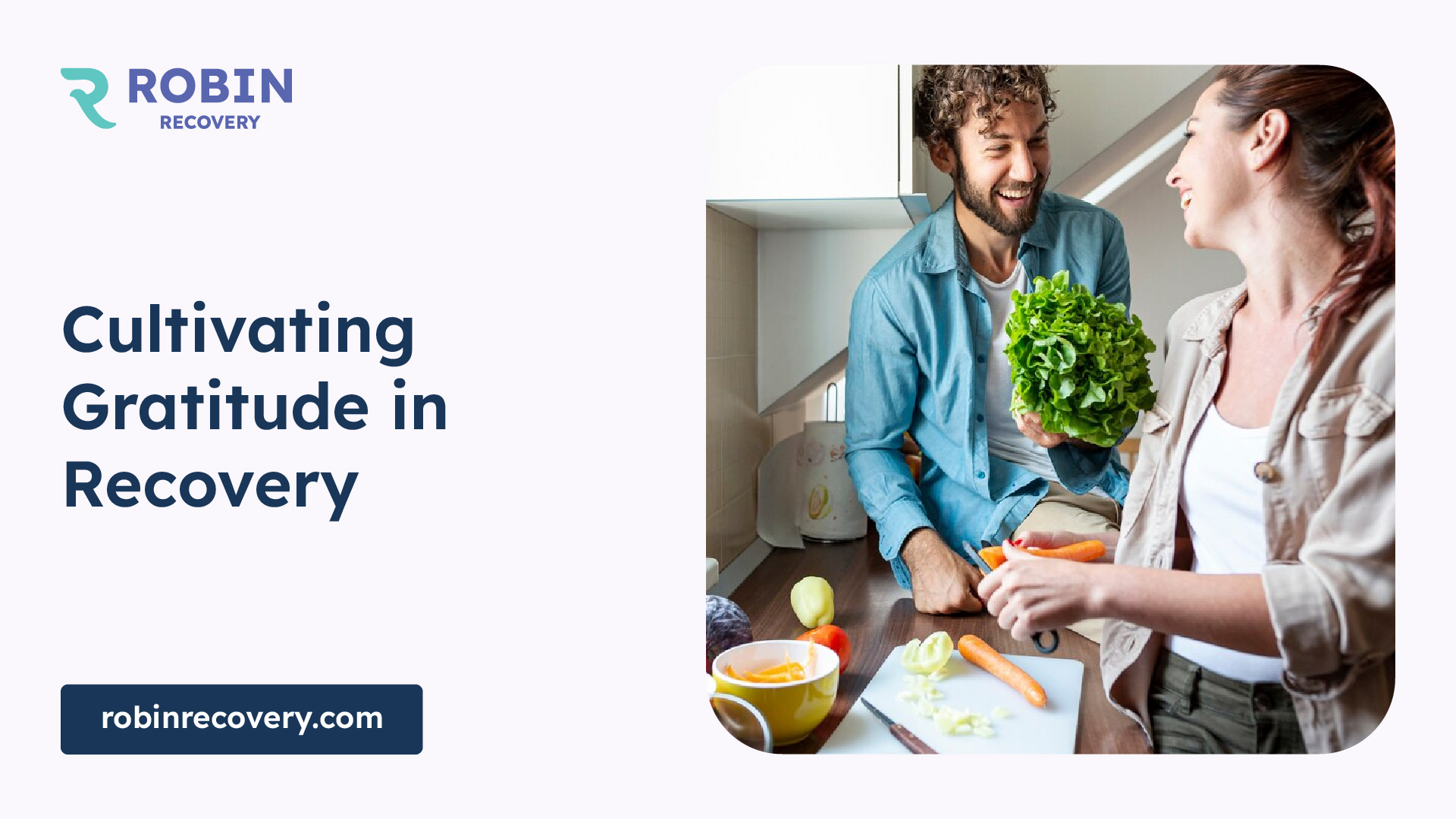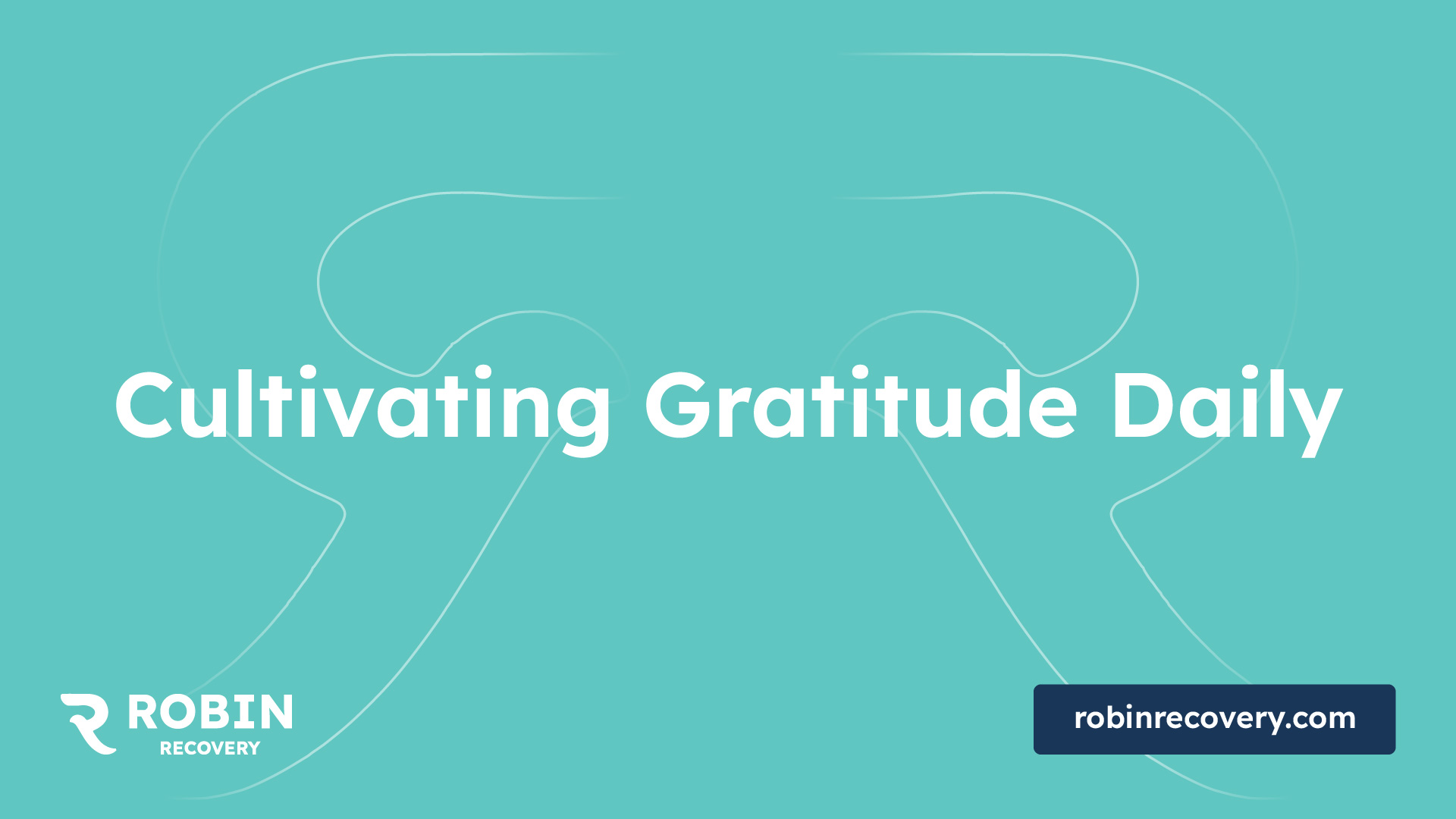Cultivating Gratitude in Recovery


Gratitude's Impact on Recovery
In the journey of addiction recovery, cultivating gratitude plays a significant role by positively impacting various aspects of an individual's life. Let's explore two key areas where gratitude can make a difference: emotional stability and self-esteem, and present moment awareness.
Emotional Stability and Self-Esteem
Gratitude can offer emotional stability, which is vital for those managing both addiction and mental health issues. It provides a powerful tool for recognizing and being thankful for even the smallest victories, helping to rebuild the damaged self-esteem often seen in dual diagnosis patients. Instead of turning to substances, practicing gratitude encourages the development of positive coping mechanisms during challenging times.
By fostering a positive outlook on life, gratitude can counterbalance the negative thought patterns commonly associated with addiction. It allows individuals to acknowledge and appreciate the good things, no matter how small they may seem. This shift in perspective can have a profound impact on one's emotional well-being, enhancing overall stability and promoting a sense of self-worth [2].
Moreover, gratitude can enhance an individual's resilience in addiction recovery. By focusing on the positives in their life, individuals can develop a greater capacity to overcome setbacks and cravings. It provides the strength and mindset needed to bounce back more effectively, ultimately contributing to long-term success in the recovery journey [2].
Present Moment Awareness
Gratitude has the power to ground individuals in the present moment, reducing anxiety about the future or regrets about the past. By regularly practicing gratitude, individuals can diminish feelings of anger, resentment, and regret—emotions that can be potential triggers for relapse. Over time, improved mood, better sleep, and stronger connections with loved ones may be noticed [1].
Cultivating an attitude of gratitude can play a vital role in the recovery process by emphasizing the importance of being fully present. It encourages individuals to embrace the current moment, appreciating the opportunities and experiences it holds. This present moment awareness can help individuals maintain their focus on sobriety and make choices aligned with their recovery goals [3].
Gratitude interventions have been shown to enhance present moment awareness and overall well-being. By incorporating gratitude exercises into daily routines, individuals can reduce stress levels and experience more positive emotions. These exercises have also been linked to better sleep, increased compassion, and stronger immune function [4].
In summary, gratitude plays a crucial role in addiction recovery by promoting emotional stability, self-esteem, and present moment awareness. By cultivating gratitude daily, individuals can experience enhanced well-being, improved resilience, and a greater sense of gratitude for the journey of recovery.
Incorporating Gratitude in Recovery Programs
In addiction recovery, incorporating gratitude into treatment programs can have a profound impact on an individual's healing journey. Gratitude practices can help shift focus from negativity to positivity, promoting emotional well-being and enhancing the recovery process. In this section, we will explore therapeutic gratitude exercises and the availability of workshops and resources that support the cultivation of gratitude in recovery.
Therapeutic Gratitude Exercises
Therapeutic gratitude exercises play a vital role in many recovery programs, helping individuals develop a gratitude-focused mindset. These exercises are often integrated into therapy sessions and self-care practices to encourage individuals to reflect on and express gratitude for various aspects of their lives. By incorporating gratitude exercises, clinicians aim to help individuals reframe their circumstances, think more positively, and sustain their recovery journey.
Some common therapeutic gratitude exercises include:
- Gratitude Journaling: Keeping a gratitude journal allows individuals to write down things they are grateful for each day. This practice helps shift their focus from what is lacking to what they have, fostering a sense of abundance and contentment. Journaling about moments of gratitude can serve as a powerful counterbalance to negative emotions and self-defeating thoughts, ultimately helping individuals maintain a positive outlook and stay motivated on their recovery journey.
- Gratitude Letters: Writing letters expressing gratitude to loved ones, mentors, or supportive figures in their lives can be a transformative exercise. By acknowledging the positive impact others have had on their recovery, individuals not only deepen their sense of gratitude but also strengthen their interpersonal connections and foster a supportive network.
These therapeutic gratitude exercises, among others, are essential components of recovery programs, helping individuals cultivate a mindset of gratitude and harness its healing power. For additional guidance and resources on incorporating gratitude into your recovery journey, workshops and resources are available.
Workshops and Resources
Recovery programs often offer workshops and resources specifically designed to support individuals in maintaining a gratitude-focused mindset during and after recovery. These workshops may include interactive sessions, discussions, and practical exercises that explore the power of gratitude in sustaining long-term recovery.
Additionally, a variety of resources are available to individuals seeking to cultivate gratitude in their recovery journey. These resources can include books, articles, online forums, and guided meditations that provide insights and techniques for incorporating gratitude into daily life.
By participating in workshops and utilizing available resources, individuals in recovery can gain valuable tools and strategies to enhance their gratitude practice. These workshops and resources serve as valuable components of comprehensive recovery programs, providing ongoing support and guidance for individuals seeking to cultivate gratitude as an integral part of their healing process.
By incorporating therapeutic gratitude exercises and accessing workshops and resources, individuals in recovery can harness the power of gratitude to transform their mindset, strengthen their recovery journey, and cultivate a deep sense of appreciation for life's blessings.

Gratitude in 12-Step Programs
Within the realm of addiction recovery, gratitude holds a significant place in the philosophy and practice of 12-Step programs. In fact, serenity and gratitude are seen as the two most important ingredients for success in these programs, emphasizing the profound impact of gratitude in the recovery process.
Serenity and Gratitude
In Alcoholics Anonymous (AA) and similar 12-Step programs, cultivating a sense of serenity and gratitude is essential. By acknowledging the things one is grateful for, individuals in recovery are encouraged to shift their focus away from negativity and resentments, promoting emotional well-being and a positive outlook on life.
Gratitude helps individuals in recovery to develop a sense of contentment and appreciation for the present moment. It allows them to find peace within themselves and their circumstances, even amidst the challenges of addiction recovery. Through the practice of gratitude, individuals can find solace and tranquility, which are crucial for maintaining sobriety.
Success Ingredients
Gratitude is considered the single most important element of the day for individuals in recovery, impacting their mental, physical, spiritual, and social health. It is emphasized as a crucial aspect for those recovering from addiction to alcohol and other drugs, loss and grief, childhood or sexual trauma, and family of origin issues. In fact, gratitude and anxiety are believed to be incompatible, making gratitude a vital tool in the recovery process.
Incorporating gratitude into daily life is an essential component of recovery. It allows individuals to shift their perspective, focusing on the positive aspects of their journey and finding reasons to be thankful. By adopting an attitude of gratitude, individuals in recovery can change their mindset, increase their resilience, and enhance their overall well-being.
Gratitude is often practiced through various techniques, such as keeping a gratitude journal, expressing gratitude in daily reflections or prayers, and sharing gratitude in group settings. These practices help individuals to remain connected to the positive aspects of their recovery journey, fostering a sense of appreciation and reinforcing their commitment to sobriety.
By embracing gratitude in 12-Step programs, individuals in recovery can experience the transformative power of gratitude in their lives. It becomes a guiding principle that supports their ongoing journey towards lasting sobriety and personal growth. To explore other aspects of gratitude in recovery, continue reading our article on the benefits of gratitude in recovery.
Benefits of Gratitude in Recovery
Incorporating gratitude into the recovery process can have profound benefits for individuals overcoming addiction. By cultivating a sense of gratitude, individuals can experience improvements in both their physical and mental health, as well as enhanced emotional well-being.
Physical and Mental Health
Practicing gratitude has been linked to improved physical health and overall well-being. Research has shown that consciously practicing gratitude can reduce feelings of stress and anxiety, which are often significant factors in substance abuse and addiction [2]. By actively acknowledging and appreciating the positive elements in one's life, individuals can manage stress levels more effectively, making it easier to cope with the challenges of recovery. This stress reduction can contribute to better overall physical health and a stronger immune system.
Furthermore, gratitude has been found to have a positive impact on mental health. A single act of thoughtful gratitude produces an immediate 10% increase in happiness and a 35% reduction in depressive symptoms. These effects emphasize the importance of practicing gratitude consistently in order to maintain long-term mental well-being. By focusing on the positives in life, individuals in recovery can develop a more positive outlook, which can be a powerful counterbalance to the negative thought patterns often associated with addiction.
Emotional Well-Being
In addition to its impact on physical and mental health, gratitude can greatly enhance emotional well-being. By cultivating a sense of gratitude, individuals in recovery foster a positive outlook on life. This involves acknowledging and appreciating even the smallest positive moments or experiences. This practice of gratitude helps individuals shift their focus from what they lack to what they have, encouraging a mindset of abundance.
The act of expressing gratitude can also increase empathy and compassion towards oneself and others. By recognizing and appreciating the support and kindness they receive from others during their recovery journey, individuals can strengthen their connections with loved ones and their support system. This sense of connectedness can provide a solid foundation for lasting sobriety and help individuals stay connected to recovery.
Moreover, gratitude can enhance an individual's resilience in addiction recovery. By focusing on the positives in their life, individuals develop a greater capacity to overcome setbacks and cravings. This ability to bounce back from challenges can contribute to long-term success in maintaining sobriety. For more information on the promises of recovery, visit our article on the promises of recovery.
Cultivating gratitude in recovery is a powerful tool that can bring about numerous benefits. By incorporating gratitude into daily life, individuals can experience improvements in their physical and mental health, as well as enhanced emotional well-being. By embracing gratitude, individuals in recovery can create a foundation for lasting sobriety and a more fulfilling life.

Cultivating Gratitude Daily
In addiction recovery, cultivating a sense of gratitude on a daily basis can have a profound impact on one's journey towards lasting sobriety. By consciously practicing gratitude, individuals can shift their focus from scarcity to abundance, helping them realize the wealth of resources, support, and positive aspects they possess. Here are two strategies for cultivating gratitude daily: shifting focus to abundance and celebrating small victories.
Shifting Focus to Abundance
Gratitude in recovery involves consciously shifting one's focus from what is lacking to what they have. By adopting a mindset of abundance, individuals can recognize and appreciate the positive aspects in their lives. This shift in perspective helps to counteract the negative thought patterns often associated with addiction and allows individuals to find contentment and fulfillment in the present moment [7].
To cultivate gratitude for abundance, individuals can:
- Keep a gratitude journal: Take a few moments each day to write down three things you are grateful for. These can be simple things like a supportive friend, a beautiful sunrise, or a moment of peace.
- Practice mindfulness: Engage in mindfulness exercises that help you become aware of the present moment and appreciate the small joys and blessings that surround you. This can be done through meditation, deep breathing exercises, or simply taking a few minutes to observe your surroundings.
Small Victories Celebration
In recovery, celebrating small victories is an important practice that cultivates gratitude. By acknowledging and celebrating even the smallest accomplishments, individuals can boost their self-esteem, reinforce positive behaviors, and maintain motivation on their recovery journey.
To celebrate small victories, individuals can:
- Set realistic goals: Break down larger goals into smaller, achievable milestones. Each time you reach a milestone, take a moment to acknowledge and appreciate your progress.
- Share achievements with a support network: Share your victories with trusted friends, family members, or a support group. Their encouragement and celebration of your accomplishments can reinforce your sense of gratitude.
- Reward yourself: Treat yourself with a small reward or practice self-care when you achieve a goal. This reinforces the positive association with your accomplishments and encourages continued progress.
By consistently practicing gratitude through shifting focus to abundance and celebrating small victories, individuals in recovery can enhance their emotional well-being, maintain a positive outlook on life, and strengthen their resilience in the face of challenges [2]. Remember, gratitude is a powerful tool that can transform your recovery journey and help you find lasting sobriety.
Strengthening Resilience with Gratitude
In addiction recovery, cultivating gratitude can play a vital role in strengthening resilience and helping individuals navigate the challenges they may face. By incorporating gratitude into their daily lives, individuals can develop the ability to overcome setbacks and maintain a positive outlook on life.
Overcoming Setbacks
Gratitude has the power to enhance an individual's resilience in addiction recovery, enabling them to bounce back from setbacks and cravings more effectively. By focusing on the positives in their life, individuals can develop a greater capacity to overcome obstacles in their recovery journey [2].
When faced with setbacks, such as a relapse or a difficult day, embracing gratitude can provide a perspective shift. Instead of dwelling on the negative aspects of the situation, practicing gratitude allows individuals to acknowledge and appreciate the progress they have made, no matter how small it may seem. This shift in focus can help to reframe setbacks as opportunities for growth and learning, bolstering resilience and motivation to continue on the path of recovery.
Positive Outlook on Life
Gratitude fosters a positive outlook on life by acknowledging and appreciating the good things, no matter how small they may seem. This positivity can be a powerful counterbalance to the negative thought patterns often associated with addiction [2].
When individuals cultivate gratitude in their daily lives, they become more attuned to the positive aspects of their experiences and surroundings. By intentionally recognizing and expressing gratitude for the people, opportunities, and moments of joy in their lives, individuals can develop a more optimistic mindset. This positive outlook not only enhances their overall well-being but also serves as a protective factor against relapse, as it helps to counteract negative emotions and cravings.
Incorporating gratitude practices, such as keeping a gratitude journal or expressing gratitude to others, can be instrumental in nurturing a positive outlook on life. These practices create a habit of focusing on the blessings and silver linings, fostering resilience and supporting long-term recovery.
By strengthening resilience through gratitude, individuals in addiction recovery can cultivate a mindset that enables them to bounce back from setbacks and maintain a positive perspective on their journey. Embracing gratitude as a daily practice empowers individuals to overcome challenges with a renewed sense of hope and determination. Remember, the power of gratitude lies not only in acknowledging the positives but also in actively expressing appreciation for them.
References
[1]: https://pacificbeachhealth.com/practicing-gratitude-during-recovery/
[2]: https://bhoperehab.com/how-can-gratitude-benefit-addiction-recovery/
[3]: https://waypointrecoverycenter.com/blog/gratitude-thanksgiving-being-grateful-stay-sober/
[4]: https://positivepsychology.com/gratitude-exercises/
[5]: https://www.hazeldenbettyford.org/articles/gratitude-early-recovery
[6]: https://www.mentalhealthfirstaid.org/2022/11/practicing-gratitude/
[7]: https://www.oasisrecovery.com/post/gratitude-in-recovery
